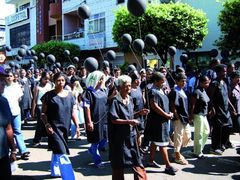Article published in the special Newsletter '15 years of PBI', October 2009
PBI Barrancabermeja
The Grassroots Women’s Organisation receives reports of the abuses committed by the paramilitaries in Barrancabermeja in the community kitchens where they work.
Yolanda Becerra, coordinator of the Grassroots Women’s Organisation (OFP) and of the Women’s Movement Against War and For Peace, remembers the paramilitary forces taking over Barrancabermeja at the end of the year 2000 and the impact this had on the social movement and particularly on the OFP.
The paramilitary incursion
Yolanda Becerra: On the night of 23 December 2000 the paramilitaries arrived in the town. They set up their command posts and they entered the 1 May neighbourhood. They killed various people in the street and on the football field. They took over the houses of the community and social leaders in the neighbourhoods, 10 or 20 of them went into each house. They held the families captive: the women had to prepare them food, they used the family members’ clothing and the children were unable to go to school.
This is how the people of Barrancabermeja responded
YB: On 24 December we went to the 1 May neighbourhood. It was like a concentration camp. There were men dressed in black and armed to the teeth as far as the eye could see and all the doors were closed. The police took food to the paramilitaries in those houses.
In order to help the families held captive, the women who came to the community kitchens to buy a bowl of soup gave us a slip of paper with the address of their homes. They knew we could make reports about what was happening.
From then on, we began to receive denouncements in the community kitchens every day. At that time, the Human Rights Defenders Working Group, together with the Oil Workers Union (USO) that played an important role then, were able to organise a special verification mission to take statements and so that people could report. This commission condemned the links between State institutions and the paramilitaries and the paramilitary responsibility for the takeover of Barrancabermeja. In spite of their anxiety and fear, many people made statements; others were assassinated or forcibly displaced.
Codes of conduct
YB: During this time, codes of conduct were imposed that established rules of behaviour for everyone: bed times, the colours people could wear etc. Young men were not allowed to wear earrings because they would have their ears pulled; young women who rejected the advances of the paramilitaries were threatened and beaten. We worked very hard for the young women; we saved a lot of young lives.
The resistance of the OFP women
YB: At that time the OFP was strong and that enabled us to resist, but the six years of resistance wore us out. The work in a context of terror and destruction of the social fabric affected the members of the organisation. The women had searched for those who had been disappeared, pulled dead bodies out of the rivers, accompanied the families, made denouncements and raised awareness of the situation with all the international commissions that arrived. All of this made us forget about ourselves and it affected us, it had an impact that has remained with us.

